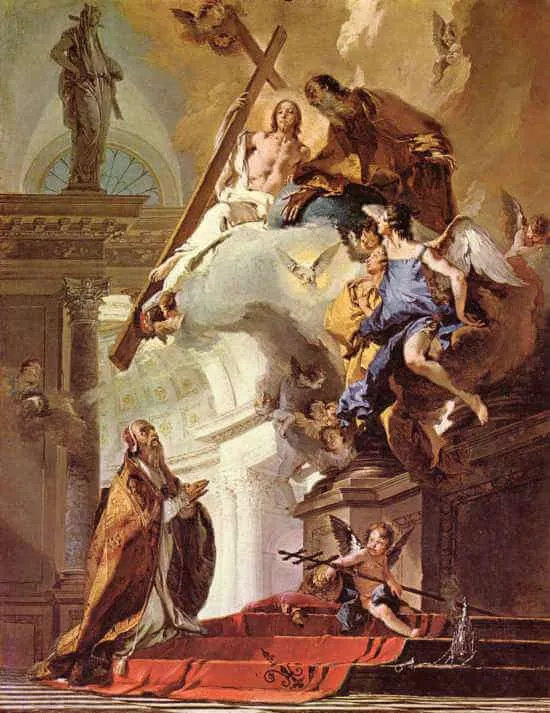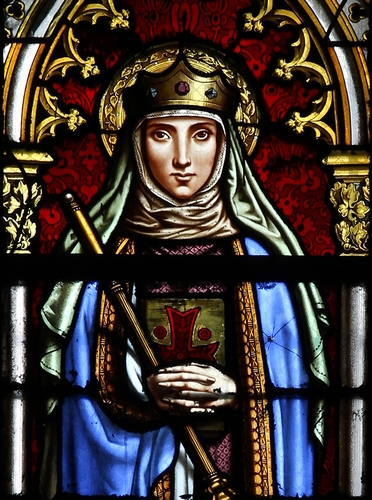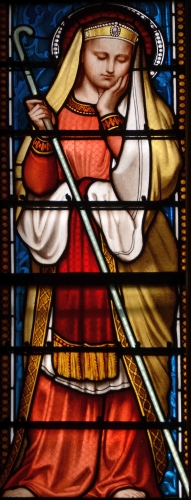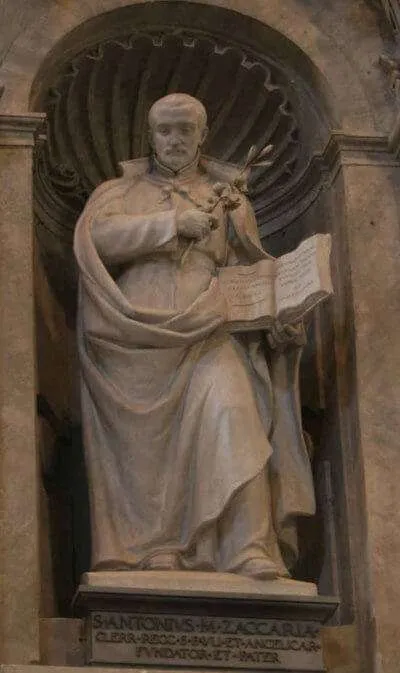c. 35–c. 99; Patron Saint of sailors, mariners, sick children, and stonecutters; Pre-Congregation canonization
Saint Peter, the first pope, was martyred around the year 64. After him, Saint Linus became pope and died around 76. He was succeeded by Saint Cletus (Anacletus), who was martyred around 88 or 92. Today’s saint, Pope Saint Clement I, succeeded Saint Cletus, making him the fourth pope. This early papal succession is clearly presented in the Roman Canon (Eucharistic Prayer I), in which the saints are listed. The first listing of the saints begins with “…the glorious ever-Virgin Mary, Mother of our God and Lord, Jesus Christ, and blessed Joseph, her Spouse, your blessed Apostles and Martyrs…” Then, the Apostles are listed, including Saint Paul, followed by the first three popes who succeeded Saint Peter: “Linus, Cletus, Clement…”
Saint Peter arrived in Rome following a persecution, leading to the establishment of the papacy in the city of Rome. Around 44, James the Apostle, son of Zebedee, was beheaded by Herod Agrippa in Jerusalem. Shortly afterward, Saint Peter was arrested but was miraculously released from prison with the assistance of an angel. After Peter gained his freedom, the Acts of the Apostles states, “…he left and went to another place” (Acts 12:17). Although Peter might have traveled to various places, Saint Paul writes that he met Peter in Antioch (Galatians 2:11). Thus, it is believed that Peter first established himself as the Bishop of Antioch before traveling to Rome. After appointing a successor in Antioch, and possibly Corinth, Peter is generally believed to have traveled to Rome around the year 54 or 55. While in Rome, he led the Church and wrote two letters. The early Church theologian Tertullian (c. 155–c. 220) wrote about the importance of apostolic succession and stated that Saint Clement, whom we honor today, was “ordained in like manner by Peter.” Therefore, Clement not only knew Saint Peter but was also ordained by him, either as a priest or a bishop.
Little is known about Pope Saint Clement’s early years. However, his pontificate greatly enriched the Church, not only through his martyrdom but also through a letter he left behind, addressed to the nascent Church in Corinth. Saint Clement is one of three early Church Fathers who hold the title “Apostolic Father,” alongside Saint Ignatius of Antioch and Saint Polycarp of Smyrna. The Apostolic Fathers are those who personally knew the Apostles and received the Gospel from them, becoming the first heirs and successors to the Apostles. Regarding Pope Saint Clement, Saint Irenaeus (c. 130–c. 202) wrote, “This man, as he had seen the blessed apostles and had been conversant with them, might be said to have the preaching of the apostles still echoing [in his ears], and their traditions before his eyes.”
Pope Saint Clement’s lengthy and heartfelt letter to the Church in Corinth addressed the community’s internal conflict and division. The Corinthians sought guidance from Pope Clement, who was delayed in responding, likely due to the persecution in Rome under the policies of Emperor Domitian. In his letter, Pope Clement begins by saying, “Owing, dear brethren, to the sudden and successive calamitous events which have happened to ourselves, we feel that we have been somewhat tardy in turning our attention to the points respecting which you consulted us…” With the death of Emperor Domitian in 96 and a temporary pause in persecution, Pope Clement was able to address the issues facing the Church in Corinth.
Pope Clement’s letter from Rome to the Corinthians serves as one of the earliest indications that the young Church recognized the authority residing in the See of Rome, initially occupied by Peter. His letter is both doctrinal and pastoral, and it was often read and revered in the early Church alongside the canonical Gospels and letters in the New Testament, although it is not included in the New Testament. To continue quoting Saint Irenaeus concerning Clement’s letter to the Corinthians, he wrote, “In the time of this Clement, no small dissension having occurred among the brethren at Corinth, the Church in Rome dispatched a most powerful letter to the Corinthians, exhorting them to peace, renewing their faith, and declaring the tradition it had recently received from the apostles…”
In addition to addressing the divisions, Pope Clement articulates the hierarchical structure of the Church, noting that the Father sent the Son, the Son sent the Apostles, and the Apostles sent their successors, and so forth. This sacramental structure proceeds from the Father in Heaven in an ordered manner through ordination.
At the beginning of the year 98, Trajan became emperor and was mostly mild in his approach to Christians, although he was not hesitant to execute or exile them if they refused to renounce their faith and honor the Roman gods. According to a fourth-century legend, Pope Clement was arrested by Emperor Trajan and exiled to the Tauric Chersonese (modern-day Crimea), where he was forced to work in a stone quarry. There, his co-prisoners, some of whom were also Christians, were starving and dehydrated. Pope Clement saw a lamb appear and, believing it a sign from Heaven, struck the ground with his ax, causing a spring of water to gush forth. This led to the conversion of many other prisoners. When this news reached the emperor, he was outraged at Pope Clement’s popularity and ordered his execution. An anchor was tied around Clement’s neck, and he was thrown into the Black Sea. The legend continues that in the mid- to late-ninth century, the brothers Saints Cyril and Methodius miraculously found his body and brought it to Rome, where it is now buried in the Church of Saint Clement.
Pope Saint Clement is among the many men and women who helped the early Church to grow and prosper. His unique role as a successor made him one of the few who became that “rock” upon which Jesus built His Church. The Church continues to grow and prosper today, thanks to the unique role of the pope and his ongoing authority to hold the “keys to the Kingdom of Heaven” to bind and loose in accord with God’s wisdom and will. Though a successor to Saint Peter might err in his personal life or in prudential decisions, when speaking definitively from the Chair of Peter, the pope will never mislead the Church, and the rock foundation will never crumble.
As we honor this early pope, pray for our current pope. Pray for his wisdom, openness to the Holy Spirit, and holiness of life. The Church throughout the world prays for the pope every day for a reason. The pope needs our prayers and the guidance of the Holy Spirit. Add your prayers to the many so that our Holy Father, the successor of Saints Peter, Linus, Cletus, and Clement, will shepherd the Church with both the mind and heart of Christ Himself.
Source: https://mycatholic.life/saints/saints-of-the-liturgical-year/november-23—saint-clement-i-pope-and-martyr—optional-memorial/








